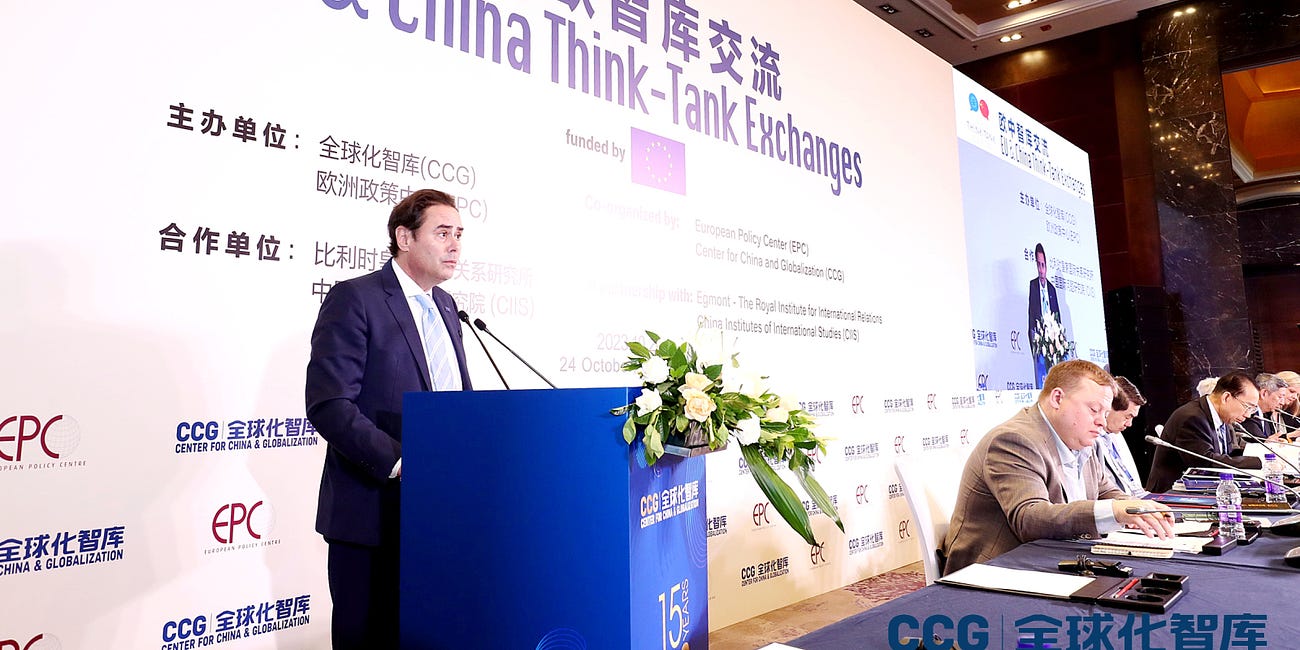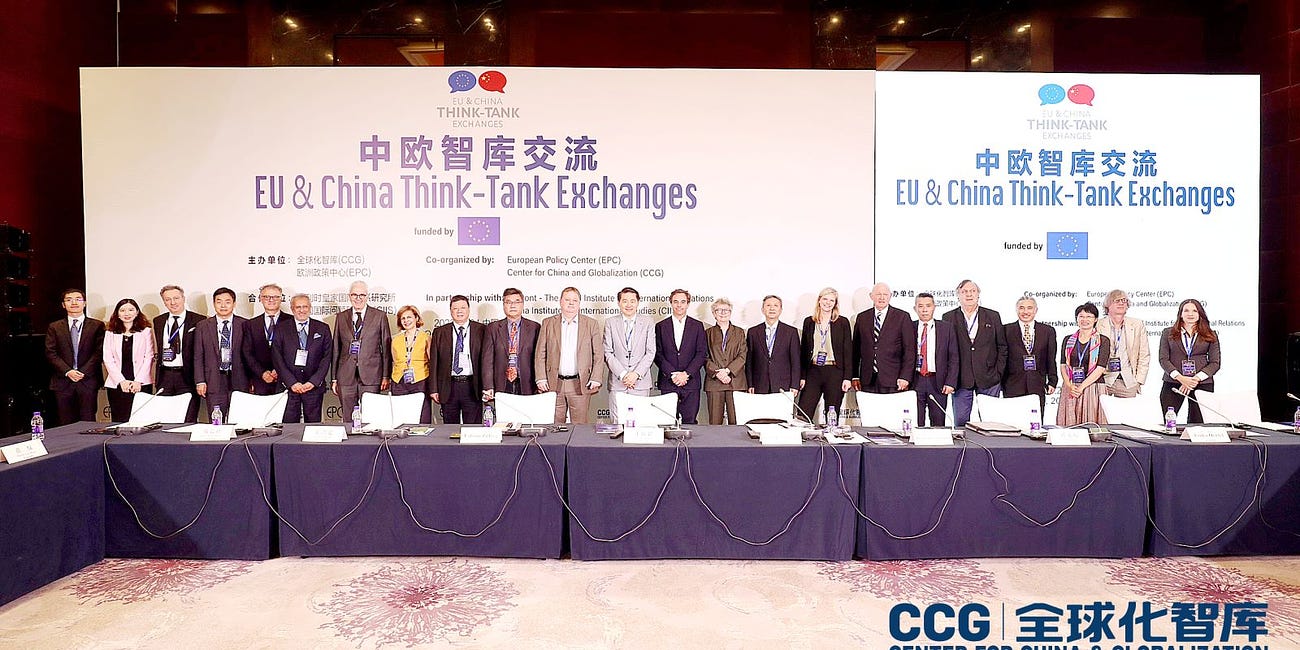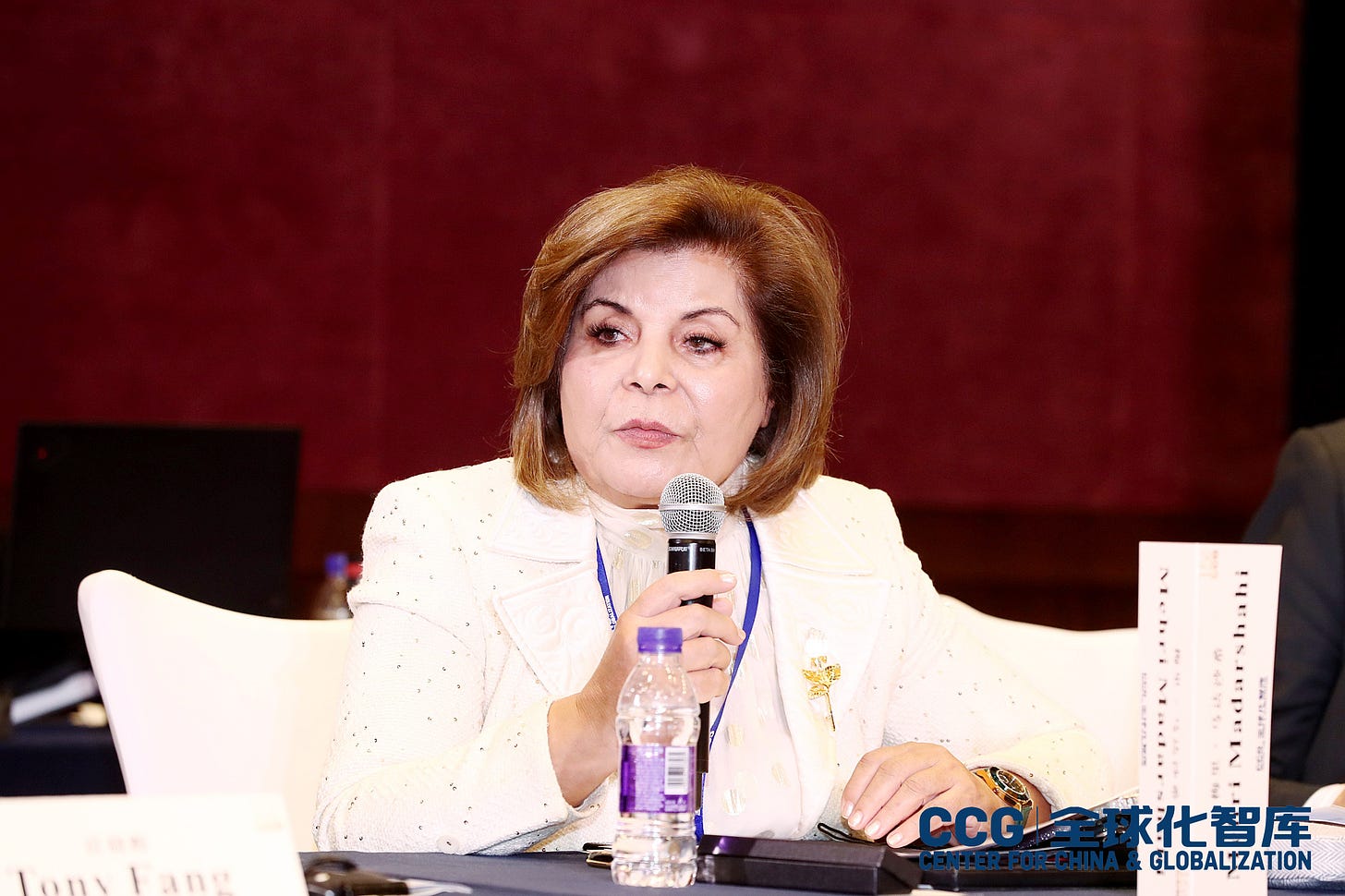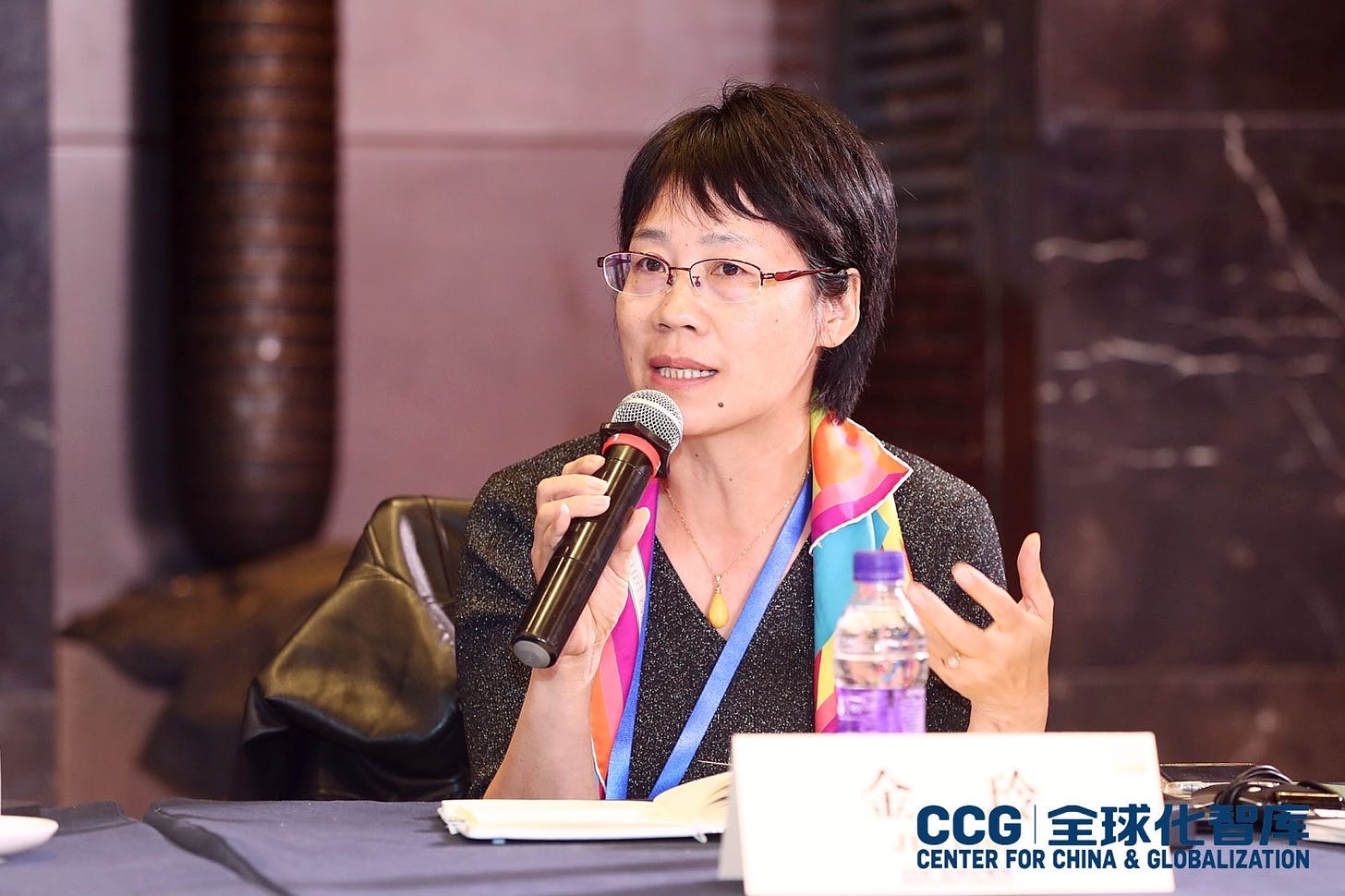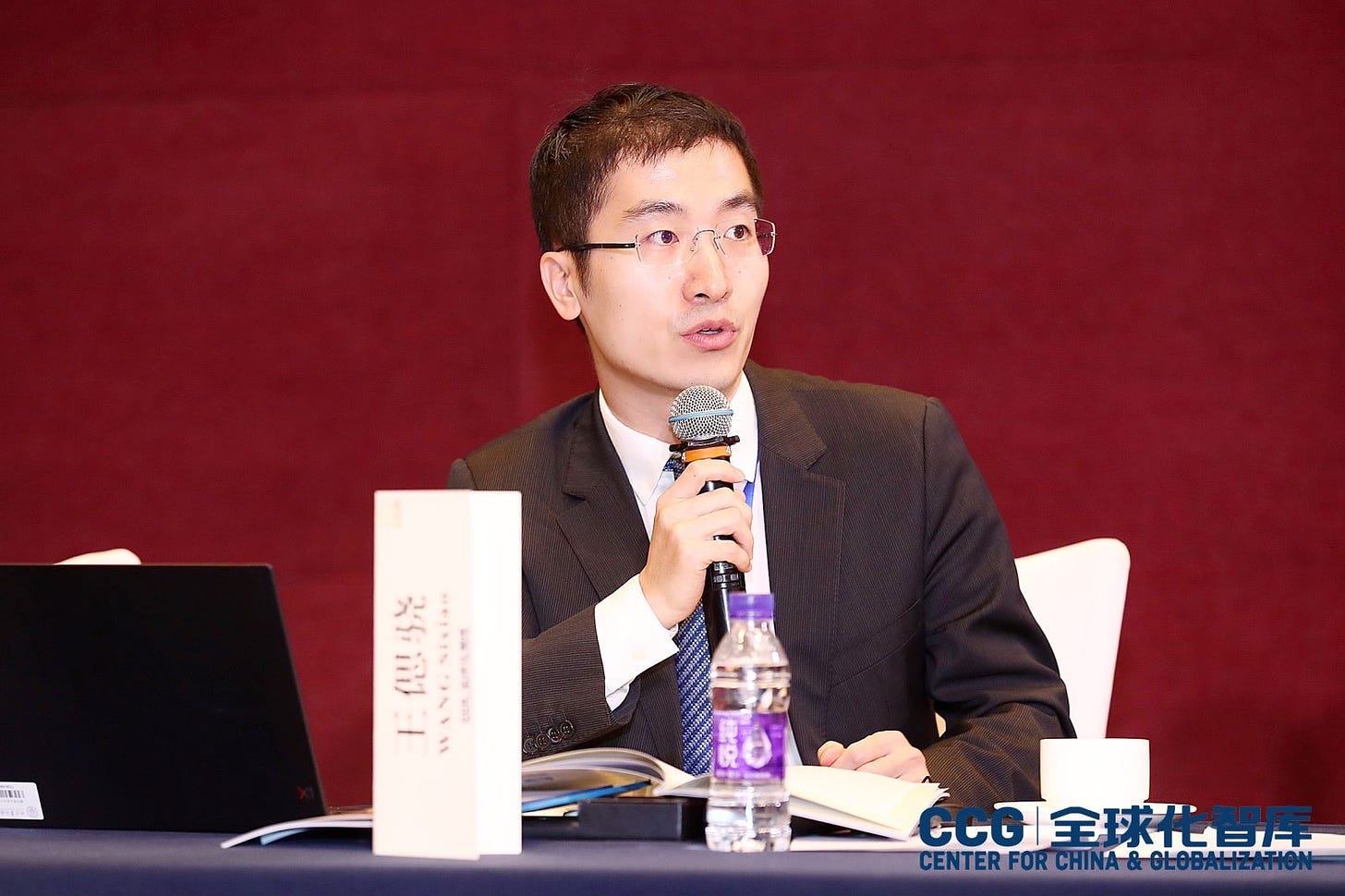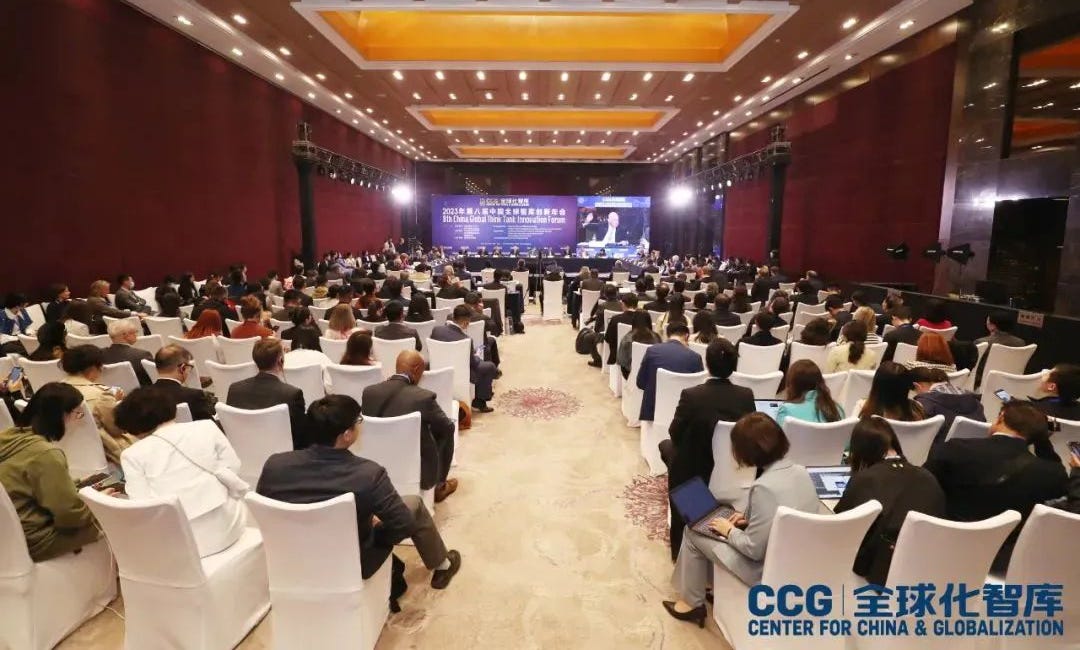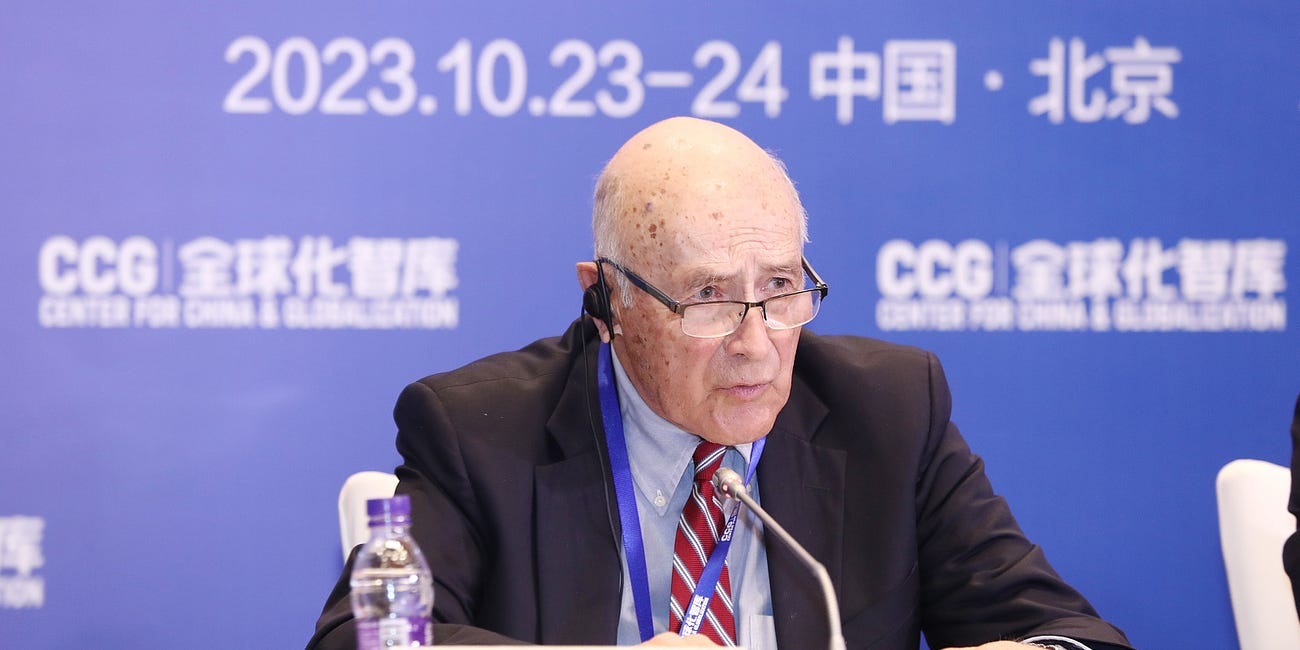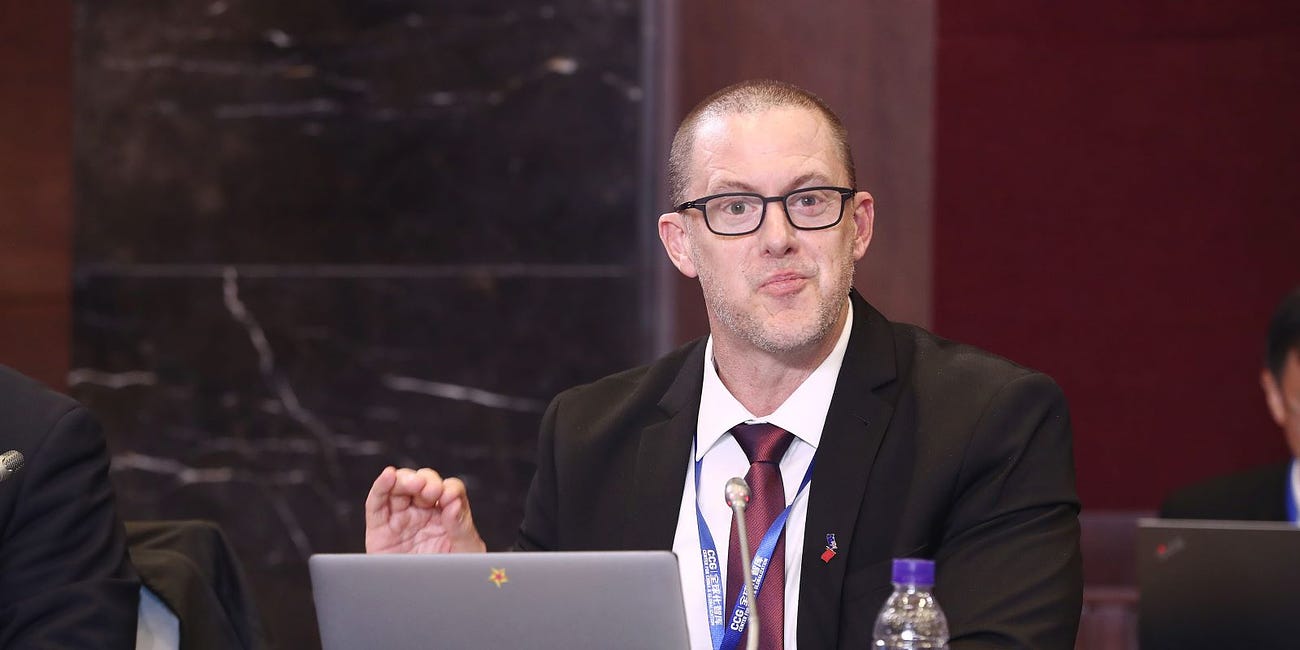Transcript Part Two of "EU-China Relations: Review and Outlook": Questions and Comments
Mehri Madarshahi, Shada Islam, WANG Yiwei, JIN Ling, Bruno Liebhaberg, Rol Reiland, Michael Pillsbury, Hans d’Orville, and WANG Caixiao engage in EU & China Think Tank Exchanges on Oct. 24, Beijing.
The following is the transcript of the interactions between panelists and roundtable speakers on "EU-China Relations: Review and Outlook" at the October 24, 2023, EU & China Think Tank Exchanges, co-organized by the European Policy Centre (EPC) and the Center for China and Globalization (CCG) and funded by the European Union, in Beijing.
This roundtable followed the opening speeches by Henry Huiyao Wang, founder and President of the CCG, Amb. Jorge Toledo Albiñana, EU Ambassador to China, and Amb. WU Hailong, President of China Public Diplomacy Association and former Chinese Assistant Foreign Minister and Ambassador to the EU.
Today's transcript covers nine panelists who contributed questions and comments to the discussion:
Mehri Madarshahi, Former Senior Economist of the United Nations, Member of the Advisory Committee at ICCSD (UNESCO), and Honorary Professor, IPP/SCUT; CCG Nonresident Senior Fellow
Shada Islam, Senior Adviser, European Policy Center
WANG Yiwei, Jean Monnet Chair Professor and Director of International Affairs, Renmin University of China; CCG Nonresident Senior Fellow
JIN Ling, Director, Department for European Studies, China Institutes of International Studies (CIIS)
Bruno Liebhaberg, Director General, Centre on Regulation in Europe (CERRE)
Rol Reiland, Ambassador of Luxemburg to China
Michael Pillsbury, Senior Fellow, The Heritage Foundation
Hans d’Orville, Former Deputy Director-General of UNESCO and Honorary Professor of IPP/SCUT; CCG International Council Member
WANG Caixiao, Associate Professor, Beijing International Studies University; CCG Nonresident Fellow
Below are the video and audio clips for the transcript. The full video recording of the forum is available on YouTube. It was also broadcast online by CCG and remains available in China.
This discussion was moderated by Ricardo Borges de Castro, Associate Director and Head of the Europe in the World Programme at the European Policy Centre.
For Part One of the roundtable which contains six speeches, please see the previous post by CCG Update:
Note that both Part One and Part Two of the transcripts are transcribed by CCG from the audio and video recordings and may contain errors. They haven’t been reviewed by the speakers.
Mehri Madarshahi, Former Senior Economist of the United Nations, Member of the Advisory Committee at ICCSD (UNESCO), and Honorary Professor, IPP/SCUT; CCG Nonresident Senior Fellow
Thank you very much. First of all to CCG and President Henry to have invited me and Mr. President of the meeting to give me the floor. I have followed the discussion this morning with great interest, but that reminded me of the background of China-EU relationship. If we all recall that EU-China Strategic Agenda for Cooperation adopted in 2013, and that called for cooperation in aerial peace, prosperity, sustainable development, and people-to-people exchanges. From there on, we are witnessing the EU-China Summit, which is being held every year to discuss political and economic relations, as well as global and regional issues and so on.
However, the recent development, which I can summarize in three categories, have caused some friction. One is geopolitical turmoil, as we have heard this morning in extenso. The second one, of course, is spilling-over of the US strategic approach to Europe. And the third one is trading balances.
But let's talk more about the common ground between China and the world. I’m not only referring to the Belt and Road Initiative, but I’m referring to the regional and international organizations in which China actively participated in various areas, including the United Nations, WTO, WHO, and etc. China is also happening engaged very actively as a secnd largest economy in the world, and has been a major player in global trade. We have seen China’s active participation in 2014 and 2015, particularly in discussion with regard to climate change. And it was, I recall very vividly, China and the United States, there were the two frontiers and champions for discussing their issues on climate change. And everybody became very hopeful that something very productive will come out of it.
China has been also engaged in peacekeeping operation in various international security issues. But of course, China has got its own principle, and this principal, understood or misunderstood by the globe, has to be also respected. I do believe in the light of what China has done, the world also has the responsibility to come together with Chinese principle and try to find a common ground in light of what China can do. And because what we need in this world is rather more cooperation than less, the world is going to a very important crisis, not only this year, but next year, and further cooperation between these two powers can solve most of the problems. Thank you very much.
Shada Islam, Senior Advisor, European Policy Center
Four points, Ricardo. I'm going to be very brief. So, first of all, a little bit of historical context. And it's true, I was a journalist when China joined the WTO in 2001. I followed it blow by blow, and it was a momentous moment. So my relationship with China goes back quite a few years. I've never seen similar shrillness to the conversation as I'm seeing now. And I feel that it's potentially very dangerous. So for me, taking forward what Henry has said, in 2024, I think we will need very cool heads, and possibly also warm hearts, because we are sharing a humanity, after all.
Elections in the US obviously a source of great unease in terms of who will be elected, but also elections in the European Parliament, so that's for us as well. First point.
Second point, I do believe that think tanks should be honest, and I appreciate very much what our colleagues have done today. But I think also, we were asked to be innovative. So I'm going to try and be a little bit innovative in three seconds. So first of all, to my Chinese friends, who I respect and hold very dear, we can hold several thoughts at the same time. We're often told, don't be binary. We can hold two, three thoughts so we can cooperate, we do compete, and we can be rivals. So that is not contradictory. We can do those things together.
Forth point, Francoise, you often say, “climate change - yes, but what?” So my suggestion is loss and reparation, climate justice. The Global South has been asking for it at the last COP meeting and the coming one as well. Let's do it. It's a real, real devastating crisis for many countries in the Global South. The SDGs, we talked about it yesterday, source of inequality - let's do something about it. China has the funding and and they know how to do that, as well as the European Union.
And finally, connectivity. I'm sorry, this something I've been saying for several years now. Why are we competing on this? Why are our egos getting in the way of reality, where a number of African countries, Asian countries, need connectivity, and yet we're working in very, very different silos.
So innovative, yes, please. And let's look ahead. It's going to be tough in 2024. But once again, with cool heads and warm hearts, I think we can get something really, really important done. And thank you.
WANG Yiwei, Jean Monnet Chair Professor and Director of International Affairs, Renmin University of China; CCG Nonresident Senior Fellow
I think the Chinese side needs to understand more about the Europeans’ very emotional and strong reactions to Ukraine. Because for the Chinese, in the past 40, 50 years, there was no war in China and in China’s neighborhood. So the Chinese, you know, there, live in a very peaceful environment. That don't understand the Europeans actually suffered so many wars from the Kosovo War, Georgian War, and then Ukrainian war, and even maybe conflicts-enabled refugees. And then the European Union also is built on the values of the World War II: it's illegal, it’s the rule of law. So the Chinese need to understand why the European Union is so sensitive. Basically, the Ukrainian were also challenged of the Westphalian system based on the sovereignty, territorial integrity. So I think maybe that's the reason we need to understand each other, on the Chinese side, not just defend policy on the relations with Russia.
But frankly, the European side also needs to understand that China never supported Russians behavior in Ukraine. That's the reason we never recognized the four states in Ukraine as part of the Russian territory, even if we didn't recognize the Crimea as part of the Russian territory. We have good relations with Russia, but for other purposes, not just to support any behaviors that Russia did to you. So that's to be distinguished.
One quick question for you, the panelist from Europe. Recently, the European Council on Foreign Affairs (ECFR), released a proposal, the so-called “strategic interdependence”. What are its relations with striking interdependence with the middle powers? What are its relations with derisking from China? And then, will this interdependence also become cause of a new risk from the middle powers? And also, what are its relations with the strategic autonomy for the European Union? I don’t know if you paid attention to the ECFR report. Thank you.
JING Ling, Director, Department for European Studies, China Institutes of International Studies (CIIS)
Thank you, Chair. I will only have a very short comment. Starting with Janka’s point that the so-called “partner, competitor and rivalry” comes from the business community. I'm here to share with you my observations.
Actually, the business community don't share the same view as regards to China-EU cooperation, definitely. Last month, when I visited Germany and France and Brussels, actually, especially, I hold talks with BDI, the DIHK, I think all of these institutions represent the business communities, but their views are actually so different. So why? My question is, why the BDI's narrative has had the upper hand? This is my question.
And also a very similar perception. This time during my visit, I talked with a lot of think tanks working on economic issues. They shared with us the so-fierce internal debate as regards to derisking, and also as regard to EU industrial policy. So it seems to me that it's far from a kind of consensus there.
So my point is, as we talk a lot about balancing relationship, whether, in next year, the debate as regards to China-EU relations should also be balanced. Since we have witnessed how it has been dangerously slipping into the so-called competition and even rivalry dimension.
Bruno Liebhaberg, Director General, Centre on Regulation in Europe (CERRE)
When we talk about international relations, we talk about strategies, strategic positioning; we talk about values; we talk about economic interest. But what is also equally important is perceptions. And and perceptions matter. Yesterday, we heard a colleague from Hong Kong University saying that he was surprised that the American researchers who come to Hong Kong are being advised to come with empty computers and burner phones. So I think it's very, very important to understand that if there is distrust in the fact that the integrity of the electronic communications will be respected, this is not something which is conducive to trust. This is not conducive to the fact that we can work together. So I think this is something that we need to add. The story of the visa, which was, not available to one member of my colleagues from EPC, is another element which is absolutely not positive.
I think that to move ahead, we need, as Francoise already said, to focus on concrete actions, concrete actions on climate, but perhaps also on one area which has not been mentioned, which is the digital area. It's clear that norms and standards are being discussed on Artificial Intelligence, on trusted flows of data transfer. These issues, resilience of digital infrastructures, norms and standards are being discussed at the world level for the moment. I think there is a necessity, urgent necessity, that we can talk to each other and work together in the international areas, in the International Telecommunications Union, in the other UN fora, OECD, etc. G7, G20. This is something where we are really creating the infrastructure for understanding each other in the years to come. These norms and standards are not technical issues for experts. They are fundamental basis for a fruitful dialogue. Thank you. Thank you very much.
Rol Reiland, Ambassador of Luxemburg to China
Thank you first of all for inviting us. It's my fist time - I've arrived only a couple of weeks ago - my first time to participate in such an interesting exchange. I would like to pick up where my predecessor just left it. So to focus really on concrete cooperation, you mentioned a digital transition, which I had on my list as well.
I see a few other areas, and I would like to put it a bit more concrete and just talking about climate change. But I see in this country, and also in Europe, I think we have still a long way to go when it comes to improving our energy efficiency standards. I think there is a lot to be done.
Circular economy. There are some interesting experiences in this country, but we also have some in Europe where maybe we could get the engineers to working together and develop common projects, and also reach common standards. Then, last but not least, green finance. I know that there is corporation on a common taxonomy on green finance. And I hear there are some positive developments. I think that's another very important area in order to a help us finance the green transition that we’re aiming at as well in China and in the EU.
And then last but not least, maybe a question nonetheless. Mrs. Shada Islam already referred to it. We will have, in 2024 elections, European Parliament elections, we may be getting a new Commission. So how do scholars and colleagues, how do you see potential impacts of that on the EU-China relations? Although obviously it's very difficult in knowing how this is going to come out. Thank you very much.
Michael Pillsbury, Senior Fellow, The Heritage Foundation
Thank you. This question is for Janka and Francoise. I hope Ricardo and Henry will get them one minute to answer. You come from very famous think tanks, European Council and ifri. I noticed when you talk, when we all talk about having a list of grievances or a list of issues where we can be innovative and constructive, it sounds like we are all deliberately leaving out a strategic nuclear issue. Colin Bradford yesterday mentioned a space code of conduct, usually the ideas to avoid arms race in space, which has already started: it's to have stability and exchange in the nuclear weapons area. Both the ifri and the European Council have sometimes addressed the issue.
So my question really is: is it a good idea when we have EU-China think tank exchanges, should we exclude all security issues? Should we exclude Ukrainian victimization by Russian aggression? Should we exclude space race? Should we be exclude China's new military and nuclear buildup? Our military now is talking about strategic nuclear breakout by China - going to double or triple the number of nuclear weapons. China now has more ICBM silos. Silo, by the way, if you're a Chinese language student, is called 发射井. So in the Cold War, if the Soviets or the Americans had a huge strategic breakout, this would be a matter of negotiation, a matter of think tanks looking into it, looking for fresh ideas.
So Henry, are we intentionally ruling out Ukraine or security issues? Or should great think tanks like ifri and European Council of Foreign Relations also include this in their thinking? Because I think there's real need for innovation in these areas. But I don't want to violate any rules about the 势力范围 and the division of labor. Thank you.
Hans d’Orville, Former Deputy Director-General of UNESCO and Honorary Professor of IPP/SCUT; CCG International Council Member
Thank you very much. Let me also thank CCG and the organizers of this forum for a very appropriate discussion, which is stimulating. And as Shada Islam said, she was shocked by the shrillness of the debate this morning. I only can endorse it, because being a European, I was listening to the EU ambassador, and I couldn't imagine that this would be really a common line of all 27 member states of the EU. Even in one country, my own country, Germany, you have the differences between the Chancellor and the Foreign Secretary. So they're speaking different, or they're singing different tunes with China. So this is a little bit complex, but what Bruno Liebhaberg said that we need a stronger element in talking to each other in a in a regular manner and in a more civilized manner. I think it's very important for the multilateralism. It's not only the UN and the UN principles which come out in the Ukraine, but it is also recently, when the United States rejoined UNESCO again. They said they go there in order to control or to suppress the influence of China. Now, if you're going to a multilateral organization, you’d better cooperate rather than control and suppress. So these are the difficulties which we are facing these days, and I think one has to reflect a little bit stronger how that can be brought to a much better and much more direct relationship. Thank you.
WANG Caixiao, Associate Professor, Beijing International Studies University; CCG Nonresident Fellow
Thanks to the CCG organizers for providing us, to the scholars, ambassadors and all the policymakers this platform to communicate with each other the sincere views on EU-China relations. I just have a follow-up question to H.E Reiland. He just raised about next year’s election in the European side. As far as from my personal observation, I find possibly when you look at EU-China relations in the next year, we could not overlook the political shifts and political forces changes within the EU itself. It seems like the right-wing political force are gaining momentum in the EU side. And I have a question to the panelists. Would this affect the next year’s EU-China relations? How do you view the right-wing forces voices that are becoming more and more stronger within the EU. Thank you. (Enditem)
[Again, this transcript is transcribed by CCG from the audio and video recordings and may contain errors. It hasn’t been reviewed by the speakers. After the nine speeches, the six keynote speakers responded to their comments and questions. That transcript will be shared later.]




